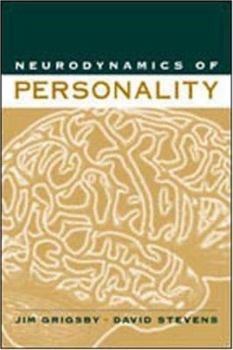Neurodynamics of Personality
Select Format
Select Condition 
Book Overview
How is each individual's unique personality formed? What is it about personality that can change, and why is change often so slow? Promising approaches to these perennial questions are suggested by... This description may be from another edition of this product.
Format:Hardcover
Language:English
ISBN:1572305479
ISBN13:9781572305472
Release Date:April 2000
Publisher:Guilford Publications
Length:436 Pages
Weight:1.70 lbs.
Dimensions:1.4" x 6.5" x 9.5"
Customer Reviews
2 ratings
From Biochemistery to Therapeutic Intervention
Published by Thriftbooks.com User , 18 years ago
This book is a gem, designed to offer a neuroscientific perspective on the dynamics of personality. It is both informative, and clinically relevant. Slowley, and quite methodically the authors build an understanding of personality in a bottom up manner, starting with modern evolutionary theory, and the principles of neuroscience and neuropsychology. What emerges is a fascinating, and ecologically valid, perspective on how various memory systems function, and contribute to the emergence of personality. The clinical implications are astounding, and certainly worthy of serious consideration.
You're a fancy robot.
Published by Thriftbooks.com User , 20 years ago
That's the disheartening take away message from this text. As organisms, we don't tend to think much about the mechanisms behind our thoughts, motivations, and actions. We implicitly assume that they all derive from "us." We feel as though we are rational entities with free will, who evaluate our environments and choose actions that will make us happy. It's a fluid and convincing process that supports itself, hence the unquestioning belief we have in our autonomy.But what makes us tick? All those wet parts in our head obviously have something to with it. We've all seen people whose mechanics have failed them, victims of Alzheimer's or stroke or schizophrenia. They're not so volitional or rational. Or what about animals? It's easier to believe that mice or ants are creatues of instinct, that they follow simple rules and don't reflect on themselves. Well, this book is one of many to illustrate that we too are mindless creatures of instinct. This makes sense if you think about it from an engineering standpoint. How could you ever devise a system that had free will? The very idea is at odds with the laws of physics, as it implies some level of operation above nature (i.e. supernatural, nondeterministic). Centuries ago, this was considered proof of the soul, and existance on a deeper plane ("I think, therefore I am."). Our behavior looks too complex to us to be the result of algorithms operating on cumulative experience, but that's exactly what it is. WE are essentially the result of unconscious processes that evaluate our environment and determine the best actions, based on the results of prior associations, to achieve evolutionary ends (procreation, ultimately, and survival, immediately). What we experience as our mind is the result of a part of the brain that claims authorship of actions already initiated at a subconscious level. It's a confabulation engine that makes coherent stories about why we chose to do things, what we intended to do, and what we're planning to do. It's a process that works seemingly backward. In this regard, we come to know ourselves much as others do, by observing ourselves. Given our more intimate relationship with our own brains, however, we have a priveleged perspective (though not in all areas, as the market for psychoanalysts can attest)).This, to me, was the most fascinating angle of the book. The "dynamics" aspect of the book is an attempt to explain the way the brain creates dynamic behavior by utilizing a collection of attractors, or default states, which interact with each other to determine an ultimate single state. Because the attractors are operating on the edge of stability, mild perterbations in the environment can produce dramatic shifts in the strengths of the various attractors, and affect the eventual output of the system. Much like a weather pattern, this results in broadly predictable trends, but transiently unpredictable behavior. I have a feeling this theoretical framework is based mostly on conjectur





